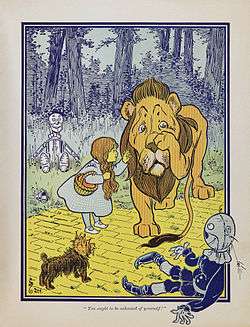Cowardice

Cowardice is a trait wherein fear and excess self-concern override doing or saying what is right, good, and of help to others or oneself in a time of need—it is the opposite of courage. As a label, "cowardice" indicates a failure of character in the face of a challenge.[1]
Many military codes of justice proscribe cowardice in combat as a crime punishable by death (note the phrase "shot at dawn").
As an opposite of an action or trait that many existing and formerly extant cultures demand, cowardice rates as a character flaw that many societies and their representatives stigmatize and/or punish.
Etymology
According to the Online Etymology Dictionary, the word coward came into English from the Old French word coart (modern French couard), a combination of the word for "tail" (Modern French queue, Latin cauda) and an agent noun suffix. It would therefore have meant "one with a tail" — perhaps from the habit of animals displaying their tails in flight ("turning tail"), or from a dog's habit of putting its tail between its legs when it is afraid or cowed. Like many other English words of French origin, this word was introduced in the English language by the French-speaking Normans, after the Norman conquest of England in 1066.[2]
The English surname Coward (as in Noël Coward), however, has the same origin and meaning as the word "cowherd".
Military law
Acts of cowardice have long been punishable by military law, which defines a wide range of cowardly offenses including desertion in face of the enemy and surrendering to the enemy against orders. The punishment for such acts is typically severe, ranging from corporal punishment to the death sentence. Cowardly conduct is specifically mentioned within the United States Uniform Code of Military Justice.
"Cowardice" was punishable by execution during World War I and those caught were often court-martialed and, in many cases, executed by firing squad. These men were often not commemorated on war memorials and their families often did not receive benefits in addition to enduring the social stigma.[3][4] Unlike the British Empire, French and German forces, the United States tried soldiers for cowardice but never followed through with execution while German commanders were less inclined to use execution as a form of punishment.[5]
See also
References
- ↑ Dictionary.com cowardice: "[the] lack of courage to face danger, difficulty, opposition, pain, etc."
- ↑ From French to English:. Faculty.uml.edu. Retrieved on 2015-12-16.
- ↑ "Executed WW1 soldiers to be given pardons". The Guardian. 16 August 2006.
- ↑ "Call to rethink cases of French WWI 'coward' soldiers". BBC. 1 October 2013.
- ↑ Woodward, David R. (2009). World War I Almanac. Infobase Publishing. p. 28.